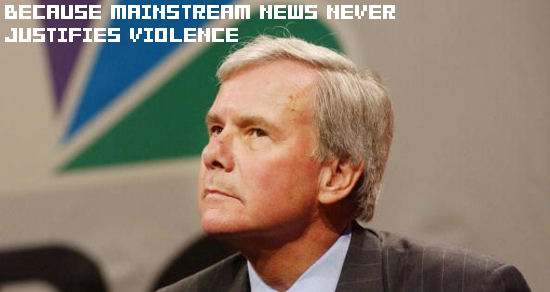Former NBC newsie Tom Brokaw (a total nobody to a Brit such as I) has decided to call both videogames and blog sites a “cancer” while simultaneously painting television as a leading light of virtue and holiness.
The comment came after Brokaw was questioned in an interview over his network’s decision to justify Virginia Tech killer Cho Seung Hui and air his stupid videos. Brokaw defended NBC’s decision as the right one, and then quickly shifted the blame onto videogames and blog sites that are, according to him, the true source of inspiration for killers. Because television has never portrayed violence in a positive light, ever … right?
Brokaw, in his blind and flailing way, has served to demonstrate quite superbly the blame culture we live in, and has provided a beautiful snapshot of the pathetic scapegoating of videogames. When the medium he was personally invested in, TV, came under fire, the man quickly attempted to change the subject and pass the buck onto the easiest target he could think of — videogames and the Internet. Brokaw has embodied society’s blame culture in one swift move, and I thank him for demonstrating the ignorance of the general public.
My Dtoid colleague Topher Cantler would also like to add that Brokaw is is a pompous, self-important dinosaur who’s too busy pretending to understand the state of the post-WWII world to notice that his sopping adult diaper needs changing, and that his position as a “newsman” can only aid him in avoiding the long overdue touch of the Grim Reaper for so long.
Thanks to Prof. Pew for the tip, and hit the jump for the radio interview in which Brokaw made this statement. It’s actually a very interesting transcription. Also, I’m leaving the great GamePolitics commentary in. I love those guys.
Hugh Hewitt: …NBC ran the Virginia Tech killer tape on the day they obtained it. Steve Capus, Brian Williams made that decision. Did they make the right decision?
Tom Brokaw: Yeah, they did.
HH: Do you not think it’s going to incite other people to try to do the same thing?
TB: No, I don’t. I think… to get back to something we were talking about earlier in general thematic terms, I don’t think we’re doing a very good job about talking about violence in this country, either. You know, Virginia Tech went away. We didn’t have any ongoing dialogue in our communities or on the air about the corrosive effect of violence.
It was not what he, what people saw of him on the air that will drive them, it’s what they read in blog sites, and what they see in video games. It’s that kind of stuff that I think is cancerous. And I’m a free speech absolutist, but I think that at the same time, we have to have free speech in some kind of a context. And part of that context is a discussion of the possible effects of it.
HH: Would it have been better for NBC to talk to someone outside of NBC before they made that decision?
TB: Oh, we talked… I was not part of the decision, because I was out of town, and I got in here late, and learned what they were going to do, and I thought that they, I thought they handled it very well…
(GP: Hewitt is ready to end the interview, but Brokaw won’t let it go)
HH: On that note of disagreement, I want to once again tell people Boom!: Voices Of The 60’s, a wonderful book…
TB: Wait a minute. Why would you disagree with me? You’re… I mean, don’t you want to know, aren’t you a free speech absolutist? Don’t you want to know what’s going on?
HH: Oh, I absolutely do. I just think that to allow someone to manipulate the news that way incentivizes…
TB: But we did it in context. We didn’t put him up there and say this was a great heroic figure.
HH: He won. And in fact…
TB: We showed how dark he was, and what the reality is. And it put a lot of campuses in this country on alert. And it’s changed… one of the things that I agree with the NRA is that if people have mental health records that are out there, people who sell guns should have access to them.
HH: The Times of London noted just a couple of weeks ago after the berserk shooting in, I think it was Norway (GP: Finland, actually), that the pictures the man left of himself were eerily reminiscent of the Virginia Tech shooter, and raised the possibility that the NBC decision had incentivized him.
TB: Now that’s their speculation… But I can pick anything that goes on, and say that was a copycat crime of some kind… You’re really indicting a network and saying if there’s some kind of a mass murder, NBC’s going to be responsible…
(GP: …isn’t this what happens to video games?)
HH: Does what appears on television influence people, is what we’re asking, and I think it does, quite decidedly.
TB: I think it’s not just television. What I said earlier is what we ought to be addressing, the whole fabric of the place of violence in our society…


